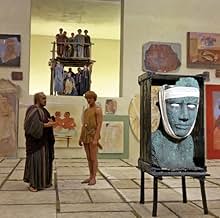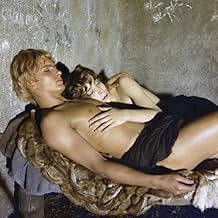Une série de contes mythiques situés au premier siècle à Rome.Une série de contes mythiques situés au premier siècle à Rome.Une série de contes mythiques situés au premier siècle à Rome.
- Réalisation
- Scénario
- Casting principal
- Nommé pour 1 Oscar
- 5 victoires et 8 nominations au total
- Trimalcione
- (as Il Moro)
- Scintilla
- (as Danica la Loggia)
- La matrona
- (as Lucia Bosé)
- Il suicida
- (as Joseph Weelher)
- Minotauro
- (as Luigi Montefiori)
Avis à la une
As Vincent Canby said in his review, from 1970 in the New York Times, 'Fellini Satyricon is its own justification'. This movie exists purely to engage on an aesthetic level. The surrealism, the carnival-of-life atmosphere, the monumental pageantry, the visual juxtaposition of beauty and ugliness, and the black humour are all the film possesses and are all it requires. I believe that Fellini's intention with this film was simply to entertain. And he was a master entertainer, no doubt.
Don't expect much in the way of characterisation, of complex plot developments, or of nifty moral expression. This is a film that looks and sounds beautiful, and it manages to hold your interest (or mine anyway, I can't speak for everyone) for two brief hours by doing just that. Fellini = Godlike genius.
The film is freely adapted from Petronius' book, which is the exploits of two young Romans, Ascilto and Encolpio, as they venture throughout the empire, indulging in both heterosexual and homosexual relationships In the course of this proliferation of sensuality, Ascilto becomes impotent and madly goes for a cure which ends in tragedy for Encolpio
The movie's treatment of the sexual decadence is remarkably powerful without being explicit In fact, in light of the mental images it presents, it actually puts on view very little on screen But there is a great quantity of mysterious whores, hedonists, gluttons, and gross indulgence in carnal pleasure In the midst of this chaos, however, there is a beautifully light reprieve as the young Romans come across a forsaken villa... A very charming slave girl has remained behind, and she playfully troubles the two men into an erotic game
Apart from that, the sex is portrayed as bizarre, tempting, suggestive of hidden secrets, violating the rules of morality, and going beyond the limit
Le saviez-vous
- AnecdotesGian Luigi Polidoro registered the title Les dégénérés (1969) for his movie first. Federico Fellini fought to use the title for his movie but lost the case. Subsequently the title was changed to Fellini Satyricon.
- GaffesIn one version, Joseph Wheeler is credited as 'Joseph Weelher'.
- Citations
Soldier at Tomb: They've stolen the hanged man! While I was with you, the thief's family took him away! I know what punishment I'll get... a horrible death. Why should I wait for it? I'd rather die by my own hands.
[pulls his sword out and is about to stab himself]
Wife of Ephesus: [stops him] No! No, my dear... To lose the two men in my life, one after the other, would be too much...
Wife of Ephesus: [looks at the corpse of her husband] Better to hang a dead husband than to lose a living lover.
[the couple replace the missing hanged corpse with the corpse of her husband]
- ConnexionsEdited into Fellini: Je suis un grand menteur (2002)
- Bandes originalesThe Drums for the Niegpadouda Dance
From Anthology of Music of Black Africa
Recorded by Everest Records
Arranged by Bernard C. Salomon
Published by Arvon Music
Meilleurs choix
- How long is Fellini's Satyricon?Alimenté par Alexa
Détails
Box-office
- Budget
- 3 000 000 $US (estimé)
- Montant brut aux États-Unis et au Canada
- 1 135 943 $US
- Montant brut mondial
- 1 138 108 $US
- Durée2 heures 9 minutes
- Mixage
- Rapport de forme
- 2.35 : 1






































